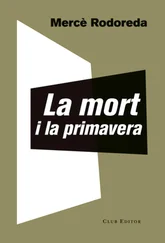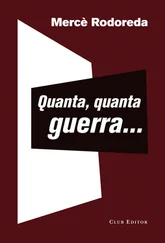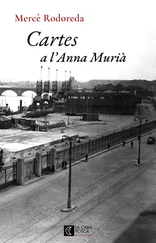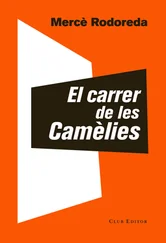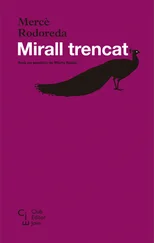
I went to the cemetery and stayed there a while. As I was returning home along the road, I spotted a bicycle propped against the front door and, standing next to it, a man. He immediately told me his name: Esteve Aran. He explained that, on his way from Arenys, when he was halfway here, a checkpoint patrol had confiscated his car and given him a bicycle by way of compensation. I led him into the house and explained everything that had happened. I spoke about my affection for his friend and, as I had not yet destroyed the papers, I allowed him to read them. The following day I showed him the will and told him I did not wish to keep anything for myself. I already had a house; I wanted to give everything to Senyora Isabel, who was old and poor. He listened, had me write down my wishes and assured me that he would make certain everything was taken care of. Shortly after his departure I, too, left, having first handed a weeping Senyora Isabel the key to the house. She produced a tiny box from her apron pocket: Look inside. Pinned to a piece of cork slept a yellow butterfly with spread wings. As soon as I recovered from the surprise, I asked her who had given it to her. One of the girls who sometimes helps me at night at the castle. She knows you. What is her name, what is she like? She knows you, she has long hair, very long. . she’s a good girl. Her name is Isabel, like mine.
I HAD ONLY BEEN WALKING FOR A SHORT WHILE WHEN I DECIDED to turn back. I stopped in front of the house: The balcony light was on, as it had been before. The door to the kitchen was unlocked, as before. I stood in the middle of the kitchen and called out a couple of times, Senyora Isabel, Senyora Isabel! There was no answer. I did not understand why I had returned. I inspected the entire house, from top to bottom. The ashes of the papers Senyor Aran and I had burned were still in the fireplace in the library. I took out the tiny box, which I had almost forgotten was in my pocket. I grasped the butterfly and caressed its wings with a finger, turning them to dust. I suddenly felt the desire to wait for dawn so I could return to the crab-infested rock, find Isabel and choke her. Why had she made me believe she wanted to kill herself? Was it worth it to see her again? What was it, in life, that was truly worthwhile? Everything I had experienced in that house had somehow shackled me, everything had the whiff of the man who had taken me in even though he had caught me stealing a piece of bread. Never again would I live in a house such as that by the sea, with the old man still locked inside with his fear. I saw the lightbulb reflected in the mirror. I tapped it so it would swing. Planted in front of the mirror was my own being: the dark shirt, the loose threads where a button had fallen off, the trousers that were a bit short. . The light was swinging back and forth. I held my breath; in the mirror, something seemed to be struggling to emerge. . I bounded up the stairs four steps at a time and jammed the backrest of a chair under the doorknob. Trucks full of men singing war tunes rolled by along the road. Lying on the tiles in front of the hearth, as I had that first night in the house, I finally managed to fall asleep. I awoke at daybreak. I went down the stairs slowly and, without thinking twice, I banged the stool against the mirror until it shattered.
XXVI THE THREE ACACIA TOWN
ANYONE WOULD HAVE STOPPED TO TAKE IN THE VIEW OF THAT dark and dreary valley cleft by a river. Not far from a farmhouse, cows were pasturing serenely under a boy’s watch. Soon both cows and boy started walking. Once they were inside the stable, I made my way down to the river, for I was parched. Beyond the farmhouse, perched atop the hill, was a town with a column of smoke billowing from its center. The smoke issued from a house, the finest in the main square. The second-floor balconies were spitting fire. Everyone was shouting. Women rushed from the portal carting chairs, armchairs, a blue and gold headboard, drawers, three bedside tables, a black rocking chair. . A few old men and children watched the women as they busied themselves emptying the house. I heard a voice saying that if the flames on the ground floor were to emerge from the portal, they would burn the three acacias in the main square. Let everything burn! House and acacias! They aren’t ours. Beside the fountain a man lay sprawled face-down, three crimson holes in his back. That’s the master of the house that’s on fire, an old man in a beret informed me, his wizened face scarcely larger than a fist. All this effort to amass a fortune and look at him now. If it were up to me, I’d toss him back inside so he would serve as kindling and nothing would be wasted.

The old man took me back to his place; he lived alone in a kind of den with recently whitewashed walls and a hearth as black as horror. He fed me and recounted the story of the owner of the burning house: He had arrived in the village as a young man, in search of work, any kind of work, and the wealthiest landowner hired him because he was as strong as an ox and not afraid of hard work. A couple of years later he married the heiress, Rosa, who had skinned knees from kneeling in constant prayer. She had always said she wanted to be a nun. Yet without intending to, the man who was a stranger to the village had frustrated her intentions: Rosa fell in love with him. The father opposed the union, but the girl did not relent until he acquiesced. The word immediately spread that she, who had turned away so many suitors, had been seduced by the drifter who had used his cunning to woo her. But the marriage grew cold. The father died, and all of the property passed into the drifter’s hands. They had a daughter, Eulàlia, despised by her father, who had not wanted children. After a strange malady, Rosa followed her father to the cemetery. The drifter treated his daughter worse than a dog: His sole preoccupation was amassing wealth. No one was allowed a morsel of bread unless he unlocked the cupboard where it was kept. He cut thin slices and let them dry out. He was a nobody who had come into money, a parvenu. He was disliked, but people kept their heads down because they needed him. He did not allow water to be extracted from the well as needed: The rope would be worn thin. He borrowed other peoples’ horses to conserve the horseshoes on his own. He let his teeth rot: Dentists were swindlers. All the fireplaces in his house had their chimneys capped to avoid the use of firewood; he believed that blocking the passage of air did more to heat the place than ruining forests by felling trees. He trimmed his fingernails with kitchen scissors because he had no others. When the barber cut his hair, he paid him with a few miserable pieces of fruit and the promise of more to come, though his trees were bare. Everyone despised him, yet anyone needing money was forced to go to him, though it was clear that the loan would come at a considerable price. Eulàlia had sad eyes and a body so frail she could barely stand. The entire village cried Miracle! Miracle! when she married the eldest son of a neighbor who had discovered her wandering lost in the forest one day, sobbing, saying she was running away. As she walked down the aisle she had the pallor of death. Her father, who did not accompany her that day, cursed her, for he would now be forced to hire someone to run the household. An old woman weighed down by many years and hardships came to serve in his home.
From time to time, he traveled to Barcelona, taking with him a small suitcase that appeared light when he left and heavy upon his return. The villagers all said that he had gone to buy gold. The miser’s house was derelict, yet in people’s minds it was covered with gold. When things finally came to a head, a few young men — the most impetuous in the village — having heard their parents lambasting the miser, broke into his house, seized him, and locked him up. Tiring of their inability to force him to divulge the location of his hidden treasure, they dragged him into the square, placed a paper hat on him and gave him a beating, while the old woman in his service and two neighbors set fire to the house. But first, they inspected the place from top to bottom, every nook and cranny, every crack in the wall. They axed closets, knocked down hollow-sounding walls, emptied wineskins, drove holes into the chimneys. . But the gold did not appear. It was decided that the old men of the village, with the help of the women and children, would dig up the miser’s lands and search the crevices in every rock. . and whoever found the gold would announce the news and it would be divided among them.
Читать дальше






